新人教版八年级英语下册教案Unit 3 Could you please clean your room Section A 1(1a-2d)》教案
(完整版)英语人教版八年级下册Unit3教学设计

(完整版)英语人教版八年级下册Unit3教学设计课题:Unit 3 Could you please clean your room?Period 1 (Section A 1a-1c)学习目标【Learning objectives】1.掌握单词: rubbish, fold, sweep, floor, take out the rubbish.2.学会礼貌地提出请求并熟练练习对话。
重点和难点【Important and difficult points】教学重点:能熟练拼读单词及短语rubbish, fold, sweep, floor, take out the rubbish.教学难点:学会用句型“Could you please…”来礼貌地提出请求。
预习内容【prepare lessons before class】1.要求学生掌握单词rubbish, fold, sweep, floor, take out the rubbish并指导学生找出家务活的表达方式。
2. 指导学生用“Could you please…”造句。
学习过程【Learning process】一、预习反馈,明确目标【Preview feedback, Clear objective】1.本节课的单词你有更多的是积累吗?2.写出更多家务琐事的表达方式:3.你知道怎样礼貌地提出请求吗?二、创设情境,自主探究【Create situations, Self inquiry】1. T: 1) Do you help to do any chores at home ?2) What work do you usually do to help your parents?3) Which one are you good at?Ss: Discuss the teacher’s questions with their partners.2. Check(√) the chores you can do in 1a and add more chores.三、展示交流,点拨提升【Display communication, Coaching to enhance】1. T: 1. Who are the two people in the picture? Why do yousay so?2. Where are they? How do you know?2. Read the chores and add more chores.3. Use “Could you please…” to make a conversation just like Peter and his mother. 1c.4. Listen to 1b and check their answers.四、师生互动,拓展延伸【Teacher-student interaction, Development】【归纳】Make polite requests. ------ Could you please…? Yes, sure./ OK, but……【拓展】1.Can you do some dishes?2. rubbish的同义词:eg. You do talk rubbish sometimes. 胡言乱语【辨析】1. do 与make2. clean 与sweepeg. Let’s clean the house. You sweep the floor and I wash the dishes.五、达标测评, 巩固提高【Evaluation standards,Consolidation and improvement】基础题I. 根据句意及首字母提示写出单词。
人教版英语八年级下册Unit3《Couldyoupleasecleanyourroom》说课稿
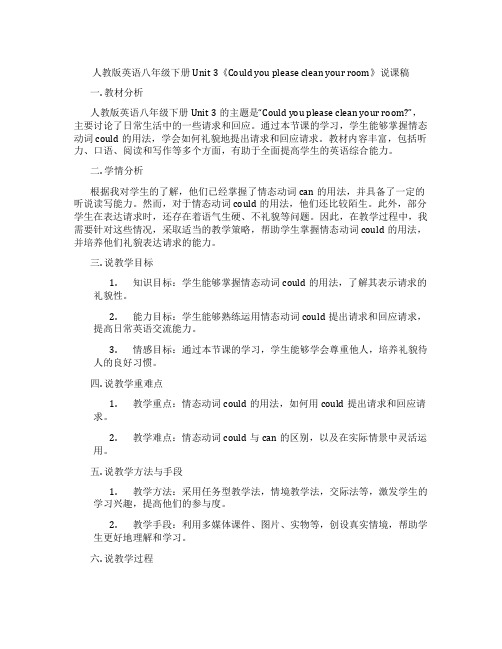
人教版英语八年级下册Unit 3《Could you please clean your room》说课稿一. 教材分析人教版英语八年级下册Unit 3的主题是“Could you please clean your room?”,主要讨论了日常生活中的一些请求和回应。
通过本节课的学习,学生能够掌握情态动词could的用法,学会如何礼貌地提出请求和回应请求。
教材内容丰富,包括听力、口语、阅读和写作等多个方面,有助于全面提高学生的英语综合能力。
二. 学情分析根据我对学生的了解,他们已经掌握了情态动词can的用法,并具备了一定的听说读写能力。
然而,对于情态动词could的用法,他们还比较陌生。
此外,部分学生在表达请求时,还存在着语气生硬、不礼貌等问题。
因此,在教学过程中,我需要针对这些情况,采取适当的教学策略,帮助学生掌握情态动词could的用法,并培养他们礼貌表达请求的能力。
三. 说教学目标1.知识目标:学生能够掌握情态动词could的用法,了解其表示请求的礼貌性。
2.能力目标:学生能够熟练运用情态动词could提出请求和回应请求,提高日常英语交流能力。
3.情感目标:通过本节课的学习,学生能够学会尊重他人,培养礼貌待人的良好习惯。
四. 说教学重难点1.教学重点:情态动词could的用法,如何用could提出请求和回应请求。
2.教学难点:情态动词could与can的区别,以及在实际情景中灵活运用。
五. 说教学方法与手段1.教学方法:采用任务型教学法,情境教学法,交际法等,激发学生的学习兴趣,提高他们的参与度。
2.教学手段:利用多媒体课件、图片、实物等,创设真实情境,帮助学生更好地理解和学习。
六. 说教学过程1.导入:通过播放一段关于孩子们日常生活的视频,引出本节课的主题“Could you please clean your room?”。
2.新课呈现:介绍情态动词could的用法,并通过例句展示如何用could提出请求和回应请求。
人教版八年级下册英语 Unit 3 Could you please clean your room 单元教案
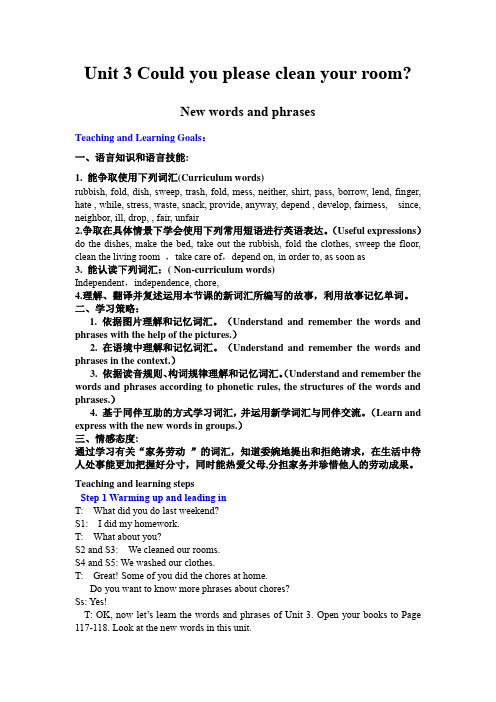
Unit 3 Could you please clean your room?New words and phrasesTeaching and Learning Goals:一、语言知识和语言技能:1. 能争取使用下列词汇(Curriculum words)rubbish, fold, dish, sweep, trash, fold, mess, neither, shirt, pass, borrow, lend, finger, hate , while, stress, waste, snack, provide, anyway, depend , develop, fairness, since, neighbor, ill, drop, , fair, unfair2.争取在具体情景下学会使用下列常用短语进行英语表达。
(Useful expressions)do the dishes, make the bed, take out the rubbish, fold the clothes, sweep the floor, clean the living room ,take care of,depend on, in order to, as soon as3. 能认读下列词汇:( Non-curriculum words)Independent,independence, chore,4.理解、翻译并复述运用本节课的新词汇所编写的故事,利用故事记忆单词。
二、学习策略:1. 依据图片理解和记忆词汇。
(Understand and remember the words and phrases with the help of the pictures.)2. 在语境中理解和记忆词汇。
(Understand and remember the words and phrases in the context.)3. 依据读音规则、构词规律理解和记忆词汇。
八年级英语下册集体备课教案:Unit 3 Could you please clean your r
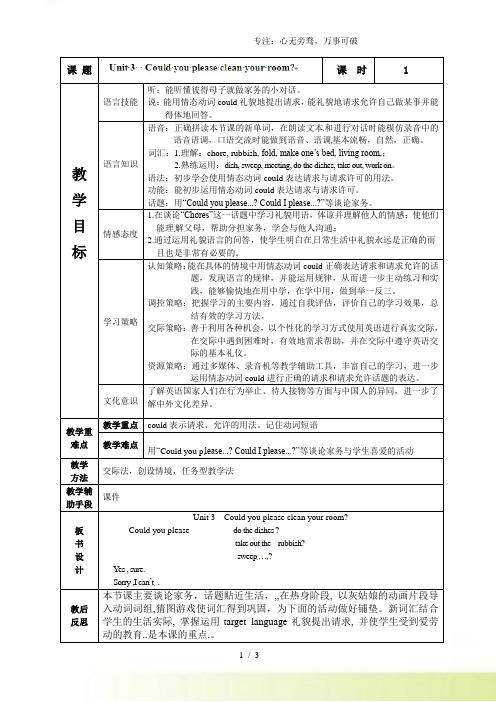
课题课时 1教学目标语言技能听:能听懂彼得母子就做家务的小对话。
说:能用情态动词could礼貌地提出请求,能礼貌地请求允许自己做某事并能得体地回答。
语言知识语音:正确拼读本节课的新单词,在朗读文本和进行对话时能模仿录音中的语音语调,口语交流时能做到语音、语调基本流畅,自然,正确。
词汇:1.理解:chore, rubbish, fold, make one’s bed, living room,;2.熟练运用:dish, sweep, meeting, do the dishes, take out, work on。
语法:初步学会使用情态动词could表达请求与请求许可的用法。
功能:能初步运用情态动词could表达请求与请求许可。
话题:用“Could you please...? Could I please...?”等谈论家务。
情感态度1.在谈论“Chores”这一话题中学习礼貌用语,体谅并理解他人的情感;使他们能理解父母,帮助分担家务,学会与他人沟通;2.通过运用礼貌语言的问答,使学生明白在日常生活中礼貌永远是正确的而且也是非常有必要的。
学习策略认知策略:能在具体的情境中用情态动词could正确表达请求和请求允许的话题,发现语言的规律,并能运用规律,从而进一步主动练习和实践,能够愉快地在用中学,在学中用,做到举一反三。
调控策略:把握学习的主要内容,通过自我评估,评价自己的学习效果,总结有效的学习方法。
交际策略:善于利用各种机会,以个性化的学习方式使用英语进行真实交际,在交际中遇到困难时,有效地需求帮助,并在交际中遵守英语交际的基本礼仪。
资源策略:通过多媒体、录音机等教学辅助工具,丰富自己的学习,进一步运用情态动词could进行正确的请求和请求允许话题的表达。
文化意识了解英语国家人们在行为举止、待人接物等方面与中国人的异同,进一步了解中外文化差异。
教学重难点教学重点could表示请求、允许的用法。
人教版英语八年级下册Unit 3《Could you please clean your room》
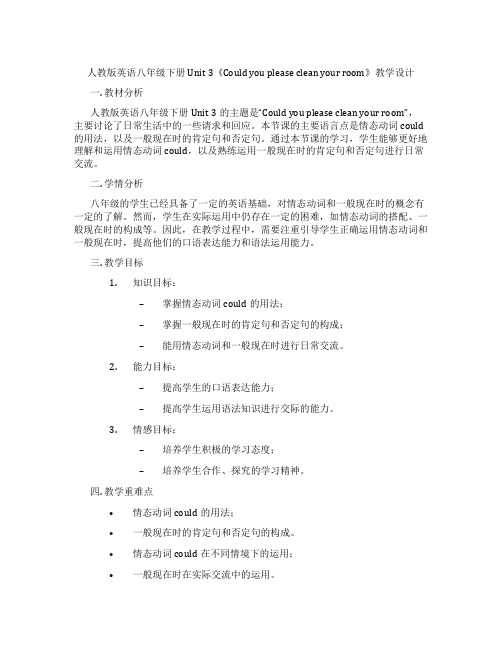
人教版英语八年级下册Unit 3《Could you please clean your room》教学设计一. 教材分析人教版英语八年级下册Unit 3的主题是“Could you please clean your room”,主要讨论了日常生活中的一些请求和回应。
本节课的主要语言点是情态动词could 的用法,以及一般现在时的肯定句和否定句。
通过本节课的学习,学生能够更好地理解和运用情态动词could,以及熟练运用一般现在时的肯定句和否定句进行日常交流。
二. 学情分析八年级的学生已经具备了一定的英语基础,对情态动词和一般现在时的概念有一定的了解。
然而,学生在实际运用中仍存在一定的困难,如情态动词的搭配、一般现在时的构成等。
因此,在教学过程中,需要注重引导学生正确运用情态动词和一般现在时,提高他们的口语表达能力和语法运用能力。
三. 教学目标1.知识目标:–掌握情态动词could的用法;–掌握一般现在时的肯定句和否定句的构成;–能用情态动词和一般现在时进行日常交流。
2.能力目标:–提高学生的口语表达能力;–提高学生运用语法知识进行交际的能力。
3.情感目标:–培养学生积极的学习态度;–培养学生合作、探究的学习精神。
四. 教学重难点•情态动词could的用法;•一般现在时的肯定句和否定句的构成。
•情态动词could在不同情境下的运用;•一般现在时在实际交流中的运用。
五. 教学方法1.任务型教学法:通过设定各种现实生活中的任务,引导学生运用所学知识进行完成,提高学生的实际运用能力。
2.情境教学法:创设各种生活情境,让学生在真实的环境中感受和理解语法知识。
3.合作学习法:学生进行小组讨论和合作,培养学生的团队精神和学习兴趣。
六. 教学准备1.教学材料:人教版英语八年级下册教材;2.教学辅助材料:PPT、图片、卡片等;3.教学设备:投影仪、电脑、黑板等。
七. 教学过程1.导入(5分钟)–利用PPT展示一些杂乱的房间图片,引导学生谈论房间的情况,激发学生的学习兴趣。
新人教版八年级英语下册教案Unit 3 Could you please clean your room Period 4教案
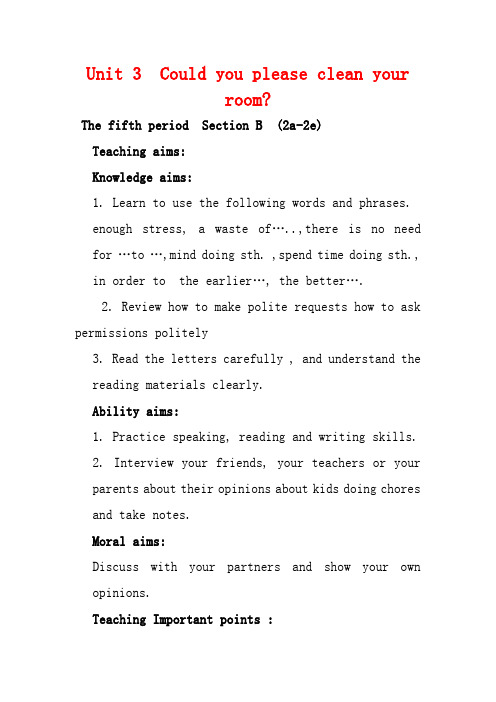
Unit 3 Could you please clean yourroom?The fifth period Section B (2a-2e)Teaching aims:Knowledge aims:1. Learn to use the following words and phrases.enough stress, a waste of…..,there is no need for …to …,mind doing sth. ,spend time doing sth., in order to the earlier…, the better….2. Review how to make polite requests how to ask permissions politely3. Read the letters carefully , and understand thereading materials clearly.Ability aims:1. Practice speaking, reading and writing skills.2. Interview your friends, your teachers or yourparents about their opinions about kids doing chores and take notes.Moral aims:Discuss with your partners and show your own opinions.Teaching Important points :Learn to use some important phrases and target languages.Teaching difficult points:1.Improve Ss’ ability to retell the letters.2.Interview your friends, your teachers or yourparents about their opinions about kids doing chores and take notes.3.Express your opinions about doing chores.Teaching procedures:Step 1 Warming-up1.Sing an English song.2.Free talk about doing chores. Could youplease ….?/Yes, sure. /….Step 2. Before reading.1.Watch a video about doing chores.2.Let Ss say out the chores in the video.eg: clean your room /help do the dishes / take the dog for a walk…3.Ask Ss to discuss the following questions witha partner.①What do you often do to help your parents at home?②Do you think kids should help out with chores athome?Students share their answers. Let Ss list the chores they can do.Step 3. While reading1.What’s “Skimming”?2. Fast reading. The Sunday Mail magazine invited parents to write about whether they think young people should do chores at home. Skim the following letters and answer the question:. Who doesn’t agree that students should do chores at home, Mr. Smith or Ms. Miller?3. Careful reading.(1).Read the first letter, and answer the following questions:Q1.What does Ms. Miller think the students should do at home?Q2.Why does Ms. Miller think there is no need for the students to do chores at home?Q3.Who does Ms. Miller think should provide a clean and comfortable home?(2).Read the second letter, and answer the following questions:Q1.Does Mr. Smith think children depend on their parents too much?Q2.How can doing chores help children in Mr. Smith’s opinion?Q3.What does Mr. Smith want us to learn from his neighbor’s story?(3).Let the Ss read the two letters, and fill in the chart in 2c.①.Read the examples, and guess the meanings of “pro”and “con”.②.According to Mr. Smith and Ms. Miller, what are the pros and cons about kidsdoing chores.(4).Students read the two letters and find out the difficult points.(5).Discuss and try to use the useful expressions in groups.a waste of…..there is no need for …to …mind doing sth.Spend time doing sth.in order tothe earlier…, the better….Step 4 After reading.1. Retell the two letters according to the key words and the chart.2. Discuss the question with a partner.Which letter do you agree with? Why?Step 5 Homework.Do you think children should do some chores at home? Make a survey in your class. Then write a report.The sixth period Section B (3a-self check )复习课Teaching aims:Knowledge aims:1. Review the following words and phrases.help with housework and chores at home, enough stress,a waste of…..,there is no need for …to …,minddoing sth. ,spend time doing sth., in order to the earlier…, the better…. It is important for sb. to do sth. develop children’s independence2. Review how to make polite requests how to ask permissions politelyAbility aims:1. Learn how to show your own opinions.2. Practice speaking, and writing skills.Moral aims:Discuss with your partners and show your own opinions.Teaching Important points :1. Learn how to show your own opinions.2. Practice speaking, and writing skills.Teaching difficult points:1.Improve Ss’ ability to write letters.2.Express your opinions about doing chores.Teaching procedures:Step 1 Warming-up1.Sing an English song.2.Free talk about doing chores or asking for parents’ permissions..Could you please ….?/Yes, sure. /…. /Could I ? /Step 2 Revision1.Have a dictation.2.Ask students to sum up the words and useful expressions in this unit.3.Ask students to complete Self check 1Check the answers:1. do the dishes2.clean your room/ the living room3.make the bed.4. fold the clothes.5. sweep the floor6. take out the rubbishStep 3 Practice1. Make conversations about doing chores or asking for parents’ permissions.eg : (1).A. Could you please sweep the floor / ?B. Yes, sure. Could you please do the dishes?A. No problem.(2).A. Could I invite my friends to a party / ?B. No, you can’t have a party. You have a teston Monday.2. Complete Self check 2.Are these polite requests or permissions? Write the numbers in the correct places in the chart.Then check the answers.3. Let the students use the questions in Self check2 to write a conversation.4. Ask several students to read out theirconversations.Step 4. Writing .1.Discuss the questions with a partner. And takenotes.Do you think children should do some chores at home?Why or why not?2.Encourage students to give their ideas.3. How to write a letter1. 信头:发信人地址和日期。
英语人教版八年级下册Unit 3 Could you..教案
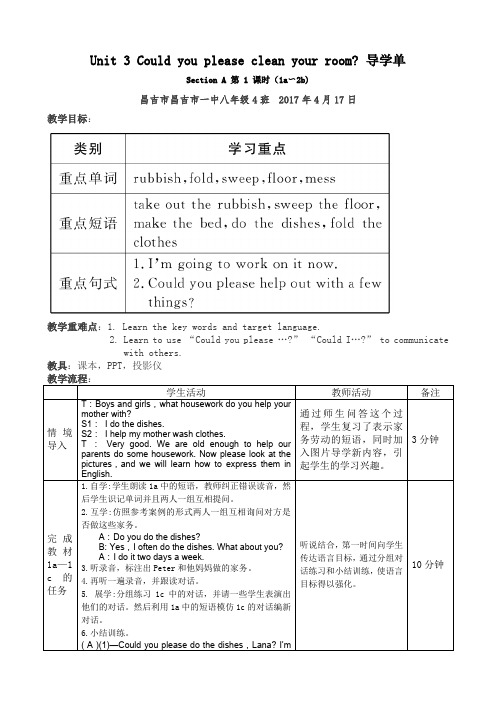
教学流程:
学生活动
教师活动
备注
情境导入
T:Boys and girls,what housework do you help your mother with?
S1:I do the dishes.
S2:I help my mother wash clothes.
T:Very good. We are old enough to help our parents do some housework. Now please look at the pictures,and we willlearn how to express them in English.
教师组织展学。
5分钟
作业
完成课本上的练习题
6.小结训练。
( A )(1)—Could you please do the dishes,Lana? I’mcleaning the room.
—.
A Yes,sure B . Yes,you can C. No,thanks D. No,youcan’t
go out?
—I’m sorry,I.
A.take in,mustn’tB.put out,couldn’t C . takeout, can’tD. look out,shouldn’t
听说结合,第一时间向学生传达语言目标,通过分组对话练习和小结训练,使语言目标得以强化。
10分钟
完成教材2a—2c的任务
1.自学:大声朗读2a中的短语和句子,然后听录音,完成2a任务,再听一遍录音,完成2b。
Unit 3 Could you please clean your room?导学单
人教新目标八年级英语下册Unit3Couldyoupleasecleanyourroom教学设计
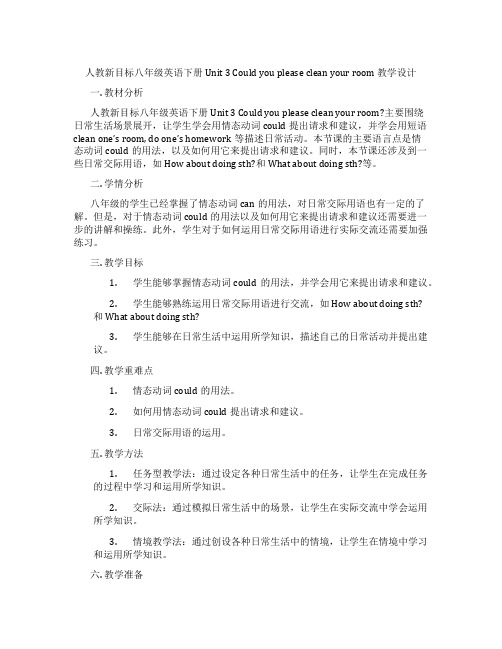
人教新目标八年级英语下册 Unit 3 Could you please clean your room 教学设计一. 教材分析人教新目标八年级英语下册Unit 3 Could you please clean your room?主要围绕日常生活场景展开,让学生学会用情态动词could提出请求和建议,并学会用短语clean one’s room, do one’s homework等描述日常活动。
本节课的主要语言点是情态动词could的用法,以及如何用它来提出请求和建议。
同时,本节课还涉及到一些日常交际用语,如How about doing sth?和What about doing sth?等。
二. 学情分析八年级的学生已经掌握了情态动词can的用法,对日常交际用语也有一定的了解。
但是,对于情态动词could的用法以及如何用它来提出请求和建议还需要进一步的讲解和操练。
此外,学生对于如何运用日常交际用语进行实际交流还需要加强练习。
三. 教学目标1.学生能够掌握情态动词could的用法,并学会用它来提出请求和建议。
2.学生能够熟练运用日常交际用语进行交流,如How about doing sth?和What about doing sth?3.学生能够在日常生活中运用所学知识,描述自己的日常活动并提出建议。
四. 教学重难点1.情态动词could的用法。
2.如何用情态动词could提出请求和建议。
3.日常交际用语的运用。
五. 教学方法1.任务型教学法:通过设定各种日常生活中的任务,让学生在完成任务的过程中学习和运用所学知识。
2.交际法:通过模拟日常生活中的场景,让学生在实际交流中学会运用所学知识。
3.情境教学法:通过创设各种日常生活中的情境,让学生在情境中学习和运用所学知识。
六. 教学准备1.教学课件:制作与本节课内容相关的课件,包括图片、视频等。
2.教学材料:准备与本节课内容相关的材料,如日常生活中的任务清单等。
人教版八年级英语下册Unit3Couldyoupleasecleanyourroom单元整体教学设计
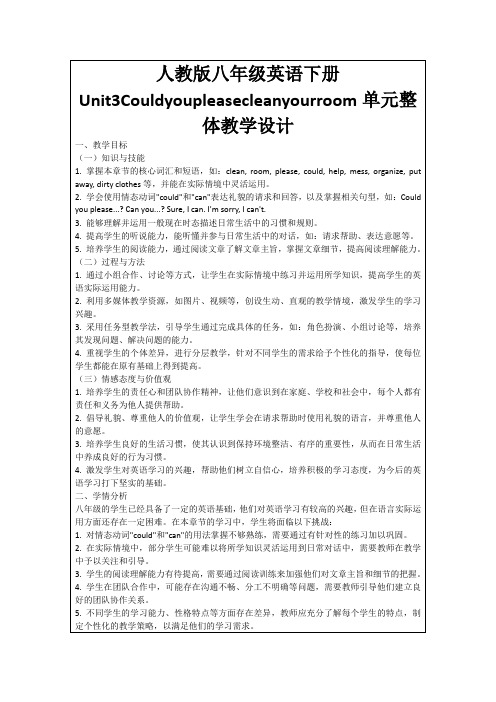
人教版八年级英语下册Unit3Couldyoupleasecleanyourroom单元整体教学设计
一、教学目标
(一)知识与技能
1.掌握本章节的核心词汇和短语,如:clean, room, please, could, help, mess, organize, put away, dirty clothes等,并能在实际情境中灵活运用。
5.培养学生的阅读能力,通过阅读文章了解文章主旨,掌握文章细节,提高阅读理解能力。
(二)过程与方法
1.通过小组合作、讨论等方式,让学生在实际情境中练习并运用所学知识,提高学生的英语实际运用能力。
2.利用多媒体教学资源,如图片、视频等,创设生动、直观的教学情境,激发学生的学习兴趣。
3.采用任务型教学法,引导学生通过完成具体的任务,如:角色扮演、小组讨论等,培养其发现问题、解决问题的能力。
3.重点:培养学生的听说能力,提高他们在实际情境中的语言运用能力。
难点:如何引导学生克服紧张情绪,积极参与课堂讨论和角色扮演。
(二)教学设想
1.针对重难点,采用以下教学策略:
a.利用多媒体教学资源,如图片、视频等,创设生动、直观的教学情境,帮助学生理解和记忆核心词汇、短语和句型。
b.设计不同类型的练习,如填空、选择、改错等,巩固学生对语言知识的掌握。
3.培养学生良好的生活习惯,使其认识到保持环境整洁、有序的重要性,从而在日常生活中养成良好的行为习惯。
4.激发学生对英语学习的兴趣,帮助他们树立自信心,培养积极的学习态度,为今后的英语学习打下坚实的基础。
二、学情分析
八年级的学生已经具备了一定的英语基础,他们对英语学习有较高的兴趣,但在语言实际运用方面还存在一定困难。在本章节的学习中,学生将面临以下挑战:
新人教版八年级英语下册教案Unit 3 Could you please clean your room Period 4教学设计
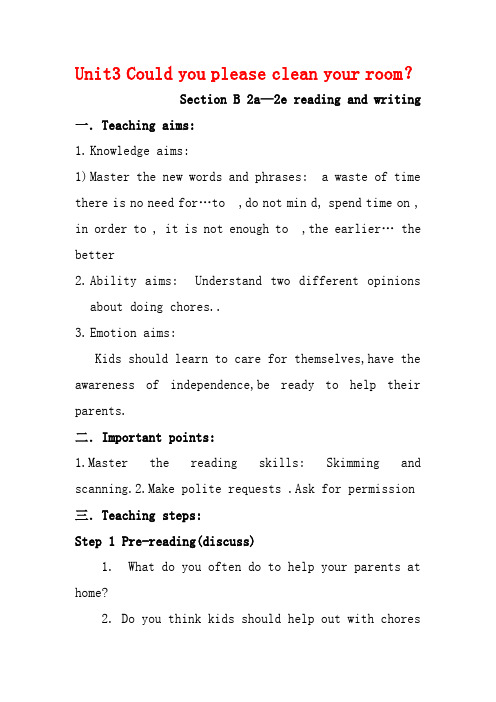
Unit3 Could you please clean your room?Section B 2a—2e reading and writing 一.Teaching aims:1.Knowledge aims:1)Master the new words and phrases: a waste of time there is no need for…to ,do not min d, spend time on , in order to , it is not enough to ,the earlier… the better2.Ability aims: Understand two different opinionsabout doing chores..3.Emotion aims:Kids should learn to care for themselves,have the awareness of independence,be ready to help their parents.二.Important points:1.Master the reading skills: Skimming and scanning.2.Make polite requests .Ask for permission 三.Teaching steps:Step 1 Pre-reading(discuss)1. What do you often do to help your parents at home?2. Do you think kids should help out with choresat home?Step 2.While reading1. Fast-reading The Sunday Mail magazine invited parents to write about whether they think young people should do chores at home. Skim the following letters. Which one agrees and which one disagrees?2.Careful reading Read letter 1 and answer the questions:(1)What does Ms Miller think students should do at home?(2)Why does Ms Miller think there is no need for students to do chores at home?(3)Who does Ms Miller think should provide a clean and comfortable home?Read it again and make true or false.( 1.) Ms. Miller thinks kids should do chores at home.( 2.) According to Ms. Miller’s letter, she thinks housework is not a waste of kids’ time.(3. )Ms. Miller and Mr. Smith have different ideas on doing chores.Read it once more, and underline the importantphrases:make sb. do, enough stress,a waste of time,let sb. do, spend one’s time on sth./(in) doing sthin order to,get good grades,provide sth for sb. ,mind doing sthRead and try to retell.... Shouldn’t make ...help with..parents .. Should provide... for.....have enough stress...students ..don’t have time to ..and..Cons ...should spend time ... ....get older.. There is no need for.....a waste of timechores ....is not difficult...Read letter 2 and answer the questions:(1)Does Mr. Smith think children dependent their parents too much?(2)How can doing chores help children in Mr. Smith’s opinion?(3)What does Mr. Smith want us to learn from his neighbor’s story?Read it again and make true or false.(1) Mr. Smith thinks it is useful to do chores(2)It is not important for children to learn how to do chores.(3)It is enough for kids to get good grades at school.(4)Doing chores doesn’t help to develop children’s independence.Read it once more and underline the important words or phrases.it is important for children to ..help their parents with housework. .,It is not enough to do..depend on their parents too much. , get this for me , develop children's independence ,teach them how to look after themselves , the idea of fairness, do one’s part in doing..as a result ,Read and try to retellDear Sir,I think _____ to learn how to ___ and help their parents with housework. It is ___ just get good grades at school. Children these days ____. They are always asking, “Could you ___?” or “Could you ___?” Doing chores ____ and ____. It also helps them to ____. Since they live in one house with their parents, they should know that everyone ____. Our neighbors’ son got into a good college but ___, he ___ how to t___. As a result, he often fell ill and his grades ___. ___kids learn to be independent, t___it is for their future.Mr. SmithStep 3 After-readingEnjoy listening Listen to the tape and then read aloud, pay attention to your pronunciation.Step4. Summary.Step5. Writing.What’s your opinion? Let’s have a debate .Discuss in groups and make a report .Report1 : We believe that children should do chores.First,______________________________ Secondly,__________________________________________ _______________________Finally,___________________________________________ ____________________________Report2: We disagree that children should do chores.One____________________________Two,____________;Three_____________________________ _____________________.Step6Homework:Finish 2d.Go writing if you don’t finish it.。
新人教版八年级英语下册教案 Unit 3 Could you please clean your room Period 3教案
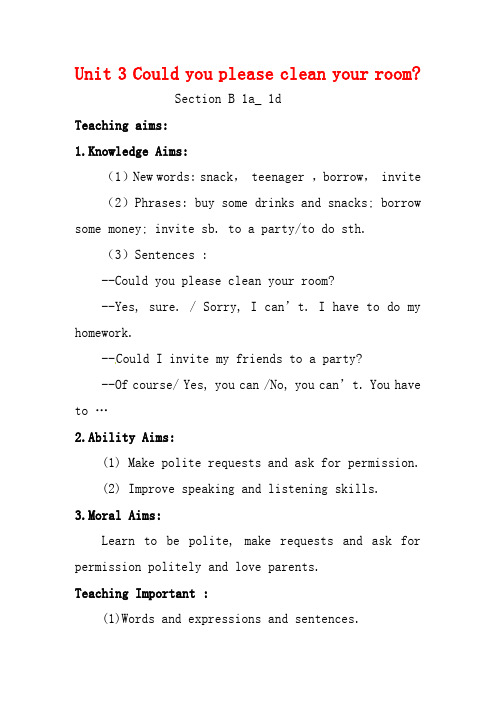
Unit 3 Could you please clean your room? Section B 1a_ 1dTeaching aims:1.Knowledge Aims:(1)New words: snack, teenager ,borrow, invite (2)Phrases: buy some drinks and snacks; borrow some money; invite sb. to a party/to do sth.(3)Sentences :--Could you please clean your room?--Yes, sure. / Sorry, I can’t. I have to do my homework.--Could I invite my friends to a party?--Of course/ Yes, you can /No, you can’t. You have to …2.Ability Aims:(1) Make polite requests and ask for permission.(2) Improve speaking and listening skills.3.Moral Aims:Learn to be polite, make requests and ask for permission politely and love parents.Teaching Important :(1)Words and expressions and sentences.(2)Make polite requests and ask for permission. Teaching difficult points:Make polite requests and ask for permission. Teaching procedures:Step 1 lead-in.1. Show the title.2. DiscussionQ: Do you help your parents do the chores at home?Q: Do your parents ask you to do a lot of things for them?What do your parents ask you to do?What do you ask your parents’ permission for? Step 2 Checking the words1. Ask the Ss to read and say the words and phrases by showing pictures.2. Encourage the students to write down the words and phrases according to the pictures.Step 3 Work on 1a.1.What do teenagers ask their parents’ permissionfor? What do parents ask their teenagers to do?Write parents or teenagers next to each phrase.1. b uy some drinks and snacks2. borrow some money3. clean your room4. invite my friends to aparty5. go to the store6. use your CD player7. take out the rubbish8. make your bed2. Check the answers.Step 4 Finish 1b.e the phrases in 1a to make conversations. Example :Parents : Could you clean your room ?Child : Yes, I can.Child : Could I invite my friend to a party ?Parents : No, you can't .2.Act out the conversation.Useful language:Step 5 Finish 1c and 1d.1.Finish 1c. Listen to a conversation between Sandyand her mom. Check (√ ) the things in 1a that youhear.1. buy some drinks and snacks2. borrow some money3. clean your room4. invite my friends to a party5. go to the store6. use your CD player7. take out the rubbish8. make your bed2.Finish 1d. Listen again. Fill in the chart.Step 6 Finish 1e.You are having a party. Invite your partner to comeyour party and ask for help with these things. So,talk about the following things with your partner.e.g.A: Would like to come to my birthday party?B: Yes, I’d love to./Sorry, I can’t. I have to…A: Could you please take out the rubbish?B: Yes, sure./No, I can’t. I have to do…1. Make conversations according to the above chart in groups.2. Show time: Act out their own conversations.3. Writing: Complete the conversations.Step 7 Homework.Write a report according to these questions:1.Who is your best friend?2.What does her/his parents ask her/him to do?3.What does she/he ask her/his parents’ permission for?Unit 3 Could you please clean your room?Grammar Focus—4c徐景玲Teaching aims:1. Words :pass , borrow, lend, finger, , hate, chore, while 2. Sentences:(1)Could I go out for dinner with my friend?—Sure, thatshould be OK.(2)Could we get something to drink after the movie?---No, you can’t. You have a basketball game tomorrow.(3)Could you please take the dog for a walk?---OK , butI want to watch one show first.(4)Could you please take out the rubbish?---Yes, sure. Ability object:1. Make polite requests and ask for permission.2. Master the structures of could .Moral objects:Learn to be polite, love doing housework and make requests and ask for permission politely.Teaching Important :(1)Words and expressions, and sentences:(2)Make polite requests and ask for permission. Teaching difficult points:Make polite requests and ask for permission. Teaching procedures:Step 1 Warming-up .1. Watch a video and answer:a. Who is the girl in the movie?b. Is the house clean or dirty?c. What did she do?2. Do some exercises.Step 2 Grammar Focus1. Make polite requests and ask for permission.(1) A: ____ I go out for dinner with my friend? B:Sure, that should be OK.(2) A: Could you please ___ the dog for a walk? B:___ ,but I want to watch one show first.(3) A: Could you please __________ the rubbish?B:____________2.Have students to read and remember the sentences of Grammar Focus by themselves.3.Have them work in groups to sum up how to Make polite requests and ask for permission.RequestsPermissionStep 4 Work on 4a.1. Write R for requests and P for permissions. Then match each one with the correct response.2.Check the answers.Step 5 Work on 4b.1. 4b Fill in the blanks in the conversation.2.check the answers.Step 6 Work on 4c.4c Make a list of things your group needs to do for a camping trip. Then discuss who will bring a tent and complete the chart.Example:A: Could you please bring Liu Chang?B: Sure. And could you please …?C: Sorry, I can’t. I have to…Step 7 Homework.Write a report according to the chart.。
新人教版八年级英语下册教案 Unit 3 Could you please clean your room教案
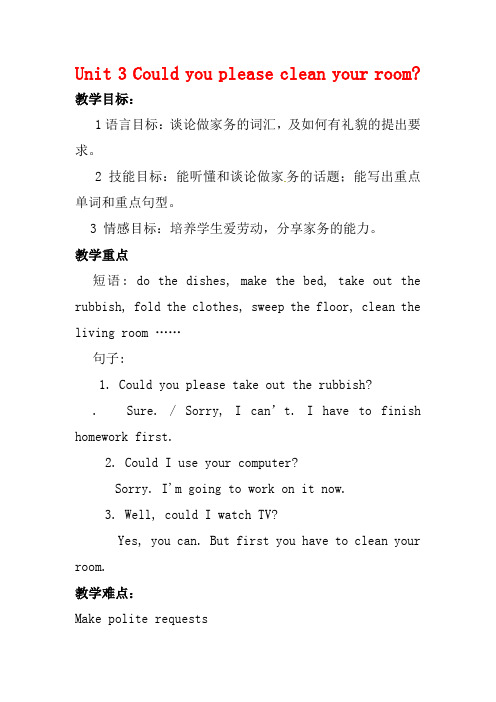
Unit 3 Could you please clean your room? 教学目标:1语言目标:谈论做家务的词汇,及如何有礼貌的提出要求。
2 技能目标:能听懂和谈论做家务的话题;能写出重点单词和重点句型。
3 情感目标:培养学生爱劳动,分享家务的能力。
教学重点短语: do the dishes, make the bed, take out the rubbish, fold the clothes, sweep the floor, clean the living room ……句子:1. Could you please take out the rubbish?. Sure. / Sorry, I can’t. I have to finish homework first.2. Could I use your computer?Sorry. I'm going to work on it now.3. Well, could I watch TV?Yes, you can. But first you have to clean your room.教学难点:Make polite requestsAsk for permission课时划分:Period 1 Section A 1a – 2dPeriod 2 Section A 3a-3cPeriod 3 Section A Grammar focus-4cPeriod 4 Section B 1a-2ePeriod 5 Section B 3a-Self checkSection A1 (1a – 2d)Step 1 Warming-upSing the song and dance to the musicStep 2 Presentation1. W atch the photos and talk about them “What doeshe do every day?’ and learn these phrases: dochores, do the dishes, make the bed, take out therubbish, fold the clothes, do the laundry, cleanthe living room.2. Look these phrases and practice the conversation:Could you please take out the rubbish? Sure. /Sorry, I can’t. I have to finish homework first.3. 1a Do you do these chores at home? Discuss themwith your partner.Step 3 Listening1b Listen. Who will do these chores? Check (√) Peter’s mother or Peter.clean the livingStep 4 Practice1c Make conversations about the chores in 1a.Make conversations.ExamplesA: Could you please...?B: Yes, sure. /All right. /No problem./Certainly.Sorry, I can't. I have to do...Sorry, I can't. I am doing...Step 5 Listening 2a&2bPeter asks his father if he can do four things. What does his father say? Check (√) “yes” or “no”. Listen again. Draw lines to the reasons.Step 6 Practice2c Make conversations using the information in 2a and 2bA: Could I use your computer?B: Sorry. I’m going to work on it now.A: Well, could I watch TV?B: Yes, you can. But first you have to clean your room?2d Role –play the conversationStep 7 Language points and summary1. Tony, could you please help out with a few things? help out 动词短语,表示在某人繁忙或遇到困难时“给予帮助”。
新人教版八年级英语下册教案Unit 3 Could you please clean your room教案

Teaching procedures :
Step 1 Leading in
Greetings .
Step 2 Pre-task
Teach the new words .
Step 3 While-task
SB Page65,1a & 1b.Point to the items and ask someone to read the each one tothe class . Play the
Call several pairs to say one or more of their conversations
教案正文
随堂记录
to the class .
SB Page 68, 2a & 2b .Read the instructions and have Ss know what to do .Play the recording and ask Ss to write their answer on their own .
Teaching goals :
1.vocabulary: snack ,borrow ,invite ,disagree ,teenager
2.能力目标:熟悉并能灵活运用Could you (please)…?
Teaching procedures :
Step 1 Leading in
Ask some Ss with questions :Could you please…? Could you…?
Then point to the phrases in the box .Ask Ss to ask and answer with a partner .
人教版英语八年级下册教案设计 Unit 3 Could you please clean your
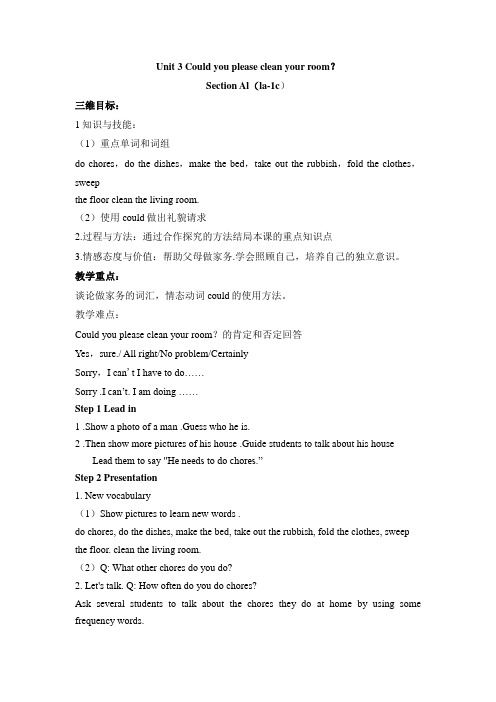
Unit 3 Could you please clean your room?Section Al(la-1c)三维目标:1知识与技能:(1)重点单词和词组do chores,do the dishes,make the bed,take out the rubbish,fold the clothes,sweepthe floor clean the living room.(2)使用 could做出礼貌请求2.过程与方法:通过合作探究的方法结局本课的重点知识点3.情感态度与价值:帮助父母做家务.学会照顾自己,培养自己的独立意识。
教学重点:谈论做家务的词汇,情态动词could的使用方法。
教学难点:Could you please clean your room?的肯定和否定回答Yes,sure./ All right/No problem/CertainlySorry,I can't I have to do……Sorry .I can’t. I am doing ……Step 1 Lead in1 .Show a photo of a man .Guess who he is.2 .Then show more pictures of his house .Guide students to talk about his houseLead them to say "He needs to do chores.”Step 2 Presentation1. New vocabulary(1)Show pictures to learn new words .do chores, do the dishes, make the bed, take out the rubbish, fold the clothes, sweep the floor. clean the living room.(2)Q: What other chores do you do?2. Let's talk. Q: How often do you do chores?Ask several students to talk about the chores they do at home by using some frequency words.3.Sentence pattern to make suggestions and the answers:(1)Ask the students to give some advice to the man whose house is dirty.(2)Could you please do…?Yes,sure./ All right/No problem/Certainly.Sorry I can’t. I have to do……Sorry:I can’t I am doing……(提示学生在拒绝别人建议请求后,最好给出理由。
(人教版)八年级下册英语教案:Unit 3 Could you pleas
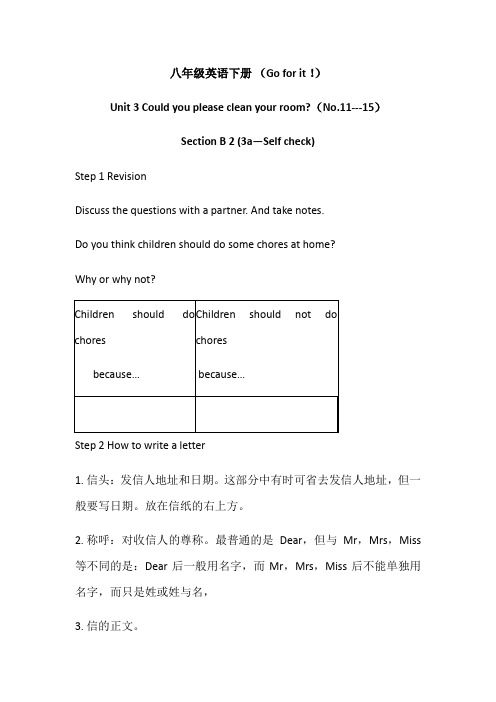
八年级英语下册 (Go for it !)Unit 3 Could you please clean your room?(No.11---15)Section B 2 (3a —Self check)Step 1 RevisionDiscuss the questions with a partner. And take notes.Do you think children should do some chores at home?Why or why not? Childrenshould do choresbecause…Children should not do chores because…Step 2 How to write a letter1. 信头:发信人地址和日期。
这部分中有时可省去发信人地址,但一般要写日期。
放在信纸的右上方。
2. 称呼:对收信人的尊称。
最普通的是Dear ,但与Mr ,Mrs ,Miss 等不同的是:Dear 后一般用名字,而Mr ,Mrs ,Miss 后不能单独用名字,而只是姓或姓与名,3. 信的正文。
4. 结尾:发信人对收信人的谦称或敬语。
放在信的右下方。
常用的英语书信结尾语如下:写给同龄人或年长的朋友: Yours sincerely,Sincerely yours,Yours 等等。
写给好朋友: Love,With love, Best wishes等等。
写给亲戚:Love,With love,Affectionately yours,Your (ever) loving son(sister 等等)。
5. 签名。
签名一般在结尾语的下面一行。
6. 常见的私人信件的开头方式:高兴:I was so glad/pleased/happy to receive your letter.感谢:Thank you for your wonderful gift / your interesting letter.关心与询问:How are you these days?/ How are you getting on these days?/ How are you getting on with your work/studies?Step 3 Writing1. Write a letter to the Sunday Mail and express your opinion.Dear Sir or Madam,I think /believe that __________. I agree/disagree that ________________.I think it is fair/unfair for children to __________________________________.2. Useful phrases.help with housework and chores at home/have enough stress from schoolspend the time on school work in order to…/There is no need for them to…It is important for sb. to do sth./It’s not enough to…develop children’s independence/The more…, the more…Step 4 Self check1. Make a list of chores using these verbs.2. Are these polite requests or permissions? Write the numbers in the correctplaces in the chart.Step 5 HomeworkUse the questions in activity 2 to write a conversation.A: _______________________ B: _______________________教后反思:。
- 1、下载文档前请自行甄别文档内容的完整性,平台不提供额外的编辑、内容补充、找答案等附加服务。
- 2、"仅部分预览"的文档,不可在线预览部分如存在完整性等问题,可反馈申请退款(可完整预览的文档不适用该条件!)。
- 3、如文档侵犯您的权益,请联系客服反馈,我们会尽快为您处理(人工客服工作时间:9:00-18:30)。
Unit 3 Could you please clean your room? 教学目标:
1语言目标:谈论做家务的词汇,及如何有礼貌的提出要求。
2 技能目标:能听懂和谈论做家务的话题;能写出重点单词和重点句型。
3 情感目标:培养学生爱劳动,分享家务的能力。
教学重点
短语: do the dishes, make the bed, take out the rubbish, fold the clothes, sweep the floor, clean the living room ……
句子:
1. Could you please take out the rubbish?
. Sure. / Sorry, I can’t. I have to finish homework first.
2. Could I use your computer?
Sorry. I'm going to work on it now.
3. Well, could I watch TV?
Yes, you can. But first you have to clean your room.
教学难点:
Make polite requests
Ask for permis sion
课时划分:
Period 1 Section A 1a – 2d
Period 2 Section A 3a-3c
Period 3 Section A Grammar focus-4c
Period 4 Section B 1a-2e
Period 5 Section B 3a-self check
Section A1 (1a – 2d)
Step 1 Warming-up
Sing the song and dance to the music
Step 2 Presentation
1. Watch the photos and talk about them “What does
he do every day?’ and learn these phrases: do
chores, do the dishes, make the bed, take out the
rubbish, fold the clothes, do the laundry, clean
the living room.
2. Look these phrases and practice the conversation:
Could you please take out the rubbish? Sure. /
Sorry, I can’t. I have to finish homework first.
3. 1a Do you do these chores at home? Discuss them
with your partner.
Step 3 Listening
1b Listen. Who will do these chores? Check (√) Peter’s mother or Peter.
Peter
Chores Peter’s
mother
do the dishes
sweep the floor
take out the
rubbish
make the bed
fold the clothes
clean the living
room
Step 4 Practice
1c Make conversations about the chores in 1a.
Make conversations.
Examples
A: Could you please...?
B: Yes, sure. /All right. /No problem./Certainly.
Sorry, I can't. I have to do...
Sorry, I can't. I am doing...
Step 5 Listening 2a&2b
Peter asks his father if he can do four things. What does his father say? Check (√) “yes” or “no”. Listen again. Draw lines to the reasons. Peter wants to… Peter’s father says…
His father’s reasons go out for dinner.
Yes No I have to do some work. go to the movies.
Yes No You have to clean your
room stay out late. Yes No
I need to eat breakfast.
get a ride. Yes No
You have a basketball
game.
Step 6 Practice
2c Make conversations using the information in 2a and 2b
A: Could I use your computer?
B: Sorry. I’m going to work on it now. A: Well, could I watch TV?
B: Yes, you can. But first you have to clean your room?
2d Role –play the conversation
Step 7 Language points and summary
1. help out 动词短语,表示在某人繁忙或
遇到困难时“给予帮助”。
help和out之间还可以加入具体的“人”。
e.g. He helped me out with my task.
他帮我完成了任务。
They helped (us) out with the clean-up.
他们帮助我们做大扫除。
2. at least 至少
e.g. We should brush our teeth at least twice a day.
我们每天应该至少刷两次牙。
3. be back 回来
e.g. I won't be back till 11:00.
我11点以前回不来。
4. any minute now
一种常见的口语表达法,相当于“随时;马上;在任何时刻”的意思,表示事情有可能在极短的时间内发生或眼下就要发生。
minute还可以用second, moment, time等词替换。
e.g. Don't worry, he will come here any minute now.
别担心, 他会马上来这儿。
The guests are arriving any time now but we’re
still not ready.
客人即刻就到,但我们还没有准备好。
We’re expecting them any moment now.
我们期待他们随时到来。
Step 8 Summary
1. New vocabulary
do the dishes, sweep the floor, take out the trash, make the bed, fold the clothes, clean the room
2. ---Could you please…?
---Yes, please. / Sorry, I can’t.
Step 8 Homework
1 List all the main phrases of doing chores that you know. (必做)
2 Make a conversation between you and your mother, using the sentence pattern “Could you please …?” (选做)。
